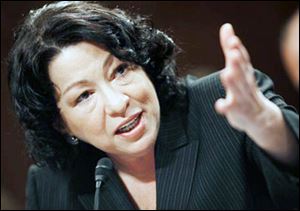
Sotomayor pressed on abortion during 3rd day of hearings
7/15/2009
Supreme Court nominee Sonia Sotomayor testifies Wednesday before the Senate Judiciary Committee.
WASHINGTON Supreme Court nominee Sonia Sotomayor declined repeatedly at Senate confirmation hearings Wednesday to disclose her views on abortion rights and said President Barack Obama never asked her before he chose her to become the first Hispanic on the court.
Abortion is often at the heart of confirmation hearings for Supreme Court justices. Abortion rights advocates want assurances that court cases upholding abortion rights will be maintained; opponents hope to to reverse precedents granting abortion rights.
Moreover, since justices on the nine-member court often serve for life, Sotomayor could help shape abortion policy for decades.
"I can't answer ... because I can't look at it in the abstract," she told Sen. Tom Coburn, a Republican as he sought to draw her out with questions about hypothetical cases, including one in which a woman wanted to abort a 38-week fetus with a birth defect.
Even if she knew more about the specifics of a case, she added, "I probably couldn't opine because I'm sure that situation might well arise before the court."
Coburn opposes abortion rights, but Sotomayor was no more forthcoming when questioned by a lawmaker on the other side of the issue.
"Would you think that Roe might be a super-duper precedent?" probed Sen. Arlen Specter, a Democrat, pointing out that the landmark 1973 case that established the right to an abortion has been upheld in 38 cases. She did not answer directly, saying instead it was a settled precedent, a phrase she first used on Tuesday.
Sotomayor also sidestepped when asked whether the U.S. Constitution's Second Amendment right to bear arms applies to state laws as well as the federal government.
And she avoided being drawn into a discussion about Congress' authority under the Constitution to regulate financial markets.
Her reticence reflected a traditional concern among high court nominees about straying into areas where they may soon have to rule gun rights and abortion among them in Sotomayor's case.
But it also appeared to reflect a calculation by Sotomayor and administration officials in charge of shepherding her nomination that she was well on her way toward confirmation and thus had nothing to gain by providing detailed answers that her critics could use.
The Judiciary Committee hearings are expected to conclude Thursday.
A vote by the full Senate to confirm Sotomayor is expected in early August, allowing her to don the robes of a justice before a scheduled hearing on Sept. 9 on a case involving federal campaign finance law.
Obama nominated her to succeed retired Justice David Souter. Because Souter generally sided with justices who favor abortion rights and affirmative action, her confirmation is not expected to alter the court's balance.
The cavernous Senate hearing room was filled for the third straight day, and tourists waited in line outside for their few moments as witnesses to history.
Inside, if there was little suspense about the ultimate outcome, senators still pressed Sotomayor closely in their 30-minute turns questioning her about her rulings and her views.